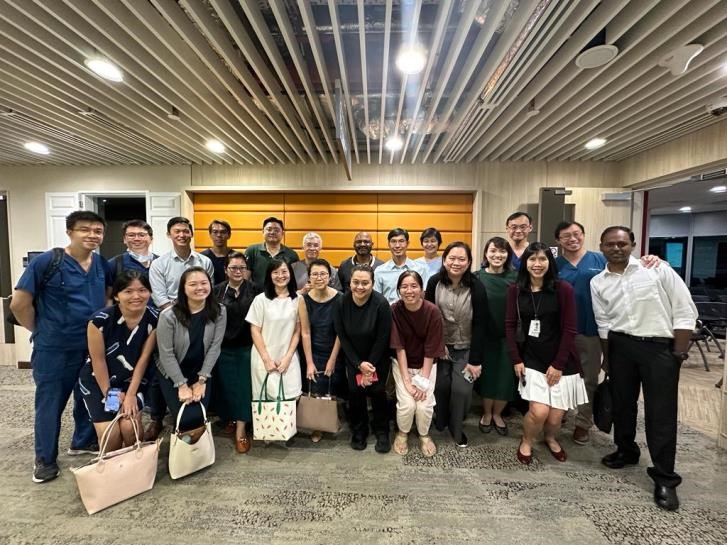We are excited to announce the launch of the Fragility Fracture Network Singapore (FFN Singapore), which took place on March 4, 2024, at Tan Tock Seng Hospital. This event also marked the first face-to-face meeting, with 22 in-person and 3 online attendees representing various government hospitals in Singapore.
FFN Singapore was established through the efforts of key champions led by Adjunct Assistant Professor Ivan Chua of Tan Tock Seng Hospital, who will also serve as the chairman for the 2024-2026 term. Joining him in leadership roles are Adjunct Assistant Professor Beatrix Wong as vice-chairman, Dr. Raymond Goi Kai Heng as secretary, Dr. Benjamin Liang Zhiren as treasurer, and Sister Tan Soak Buay as the Allied Health Lead.
FFN Singapore has outlined its plans for the next two years, focusing on three major areas. First, they aim to establish clinical guidelines or standards of care for geriatric fragility hip fractures, secondary fracture prevention, pre-osteoporosis treatment dental screening, and the prevention of medication-related osteonecrosis of the jaw (MRONJ). Second, they plan to facilitate the sharing of clinical practices across all public hospitals in Singapore. Lastly, they intend to enhance practice standards across these hospitals.
FFN Singapore has already been actively involved in several events, including participation in the first FFN Asia Pacific Webinar 2024 and the recent Asia Pacific Regional Congress held in Malaysia, where they had both delegates and speakers. FFN Global looks forward to collaborating more with FFN Singapore in the years to come!

Rehabilitation Nurses in Portugal have room to improve their knowledge of osteoporosis and fragility fractures (FF). A hybrid educational programme proved effective in improving nurses’ knowledge, especially among specialist and orthopaedic service nurses.
Nurses’ knowledge about Osteoporosis and FF is considered insufficient, even among professionals directly dealing with these patients, as evidenced by international data. Continuing professional training can contribute to improving the quality of care for individuals who have experienced a FF through the implementation of educational programmes. The study aimed to assess the knowledge of Rehabilitation Nurses in Portugal on osteoporosis and fragility fractures and to evaluate the impact of a specific educational programme on nurses’ knowledge.
In Phase I, a cross-sectional study involved 452 participants, utilizing a 26-question knowledge test. In Phase II, a quasi-experimental study included 42 nurses from 28 hospitals, subjected to a 30-h hybrid educational programme. The programme comprised 9 online (2 h 30 min each) and 2 live sessions, covering assessment, pharmacological and non-pharmacological treatment, monitoring, project planning, consultations, and outcome indicators measurement. A before-and-after programme knowledge test was administered.
The results of the study indicated that:
According to the authors: ‘This two-phase study highlights the importance of addressing knowledge gaps among healthcare professionals, with a specific focus on rehabilitation nurses, in the context of osteoporosis and fragility fractures. We strongly recommend that all nursing degrees should incorporate a module of 40 h dedicated to osteoporosis and fragility fractures’.
Read the article here!
Mobile health (mHealth) systems are a promising alternative for rehabilitation of hip fracture, addressing limited healthcare resources.
In a multicentre open-label randomised controlled trial conducted across 3 hospitals in Andalusia (Spain), 110 patients older than 65 with a hip fracture, who were previously independent and lacked cognitive impairment were recruited with their caregivers. The intervention group underwent a 12-week health education and tele-rehabilitation programme through the ActiveHip + mHealth intervention. The primary outcome, physical performance, was assessed using the Short Physical Performance Battery at three time points: at hospital discharge (baseline), 3-month after surgery (post intervention) and 1-year after surgery follow-up.
The study found that ActiveHip+ may be effective to recover patients’ objectively measured physical performance and to reduce anxiety and pain, but may have no effects on functional status, depression, fear of falling and quality of life. With respect to caregivers, the intervention reduced their burden and depression, but not fear of falling, low back pain, quality of life and self-reported fitness. None of these effects persisted at the 1-year after surgery follow-up, suggesting that a 3-month intervention may have been insufficient to promote long-lasting behavioural changes.
According to the authors: ‘ActiveHip + mHealth intervention may be effective for recovering physical performance in older adults with hip fracture. Importantly, the implementation of ActiveHip + into daily clinical practice may be feasible and has already been adopted in 18 hospitals, mostly in Spain but also in Belgium and Portugal. Thus, ActiveHip + could offer a promising solution when rehabilitation resources are limited’.
Click here to read the article!
A study in Malaysia emphasized the necessity of a FLS to enhance secondary fracture prevention and identified several challenges, including the lack of confidence among nurses in taking up the role of FLS coordinator, the need to implement the service within the constraints of limited resources, and the lack of prescribing rights for antiosteoporosis medications among primary care physicians.
A Fracture Liaison Service (FLS) is a coordinator-based model developed to reduce subsequent fractures and mortality by increasing the diagnosis of osteoporosis and improving its treatment. This qualitative study aimed to explore the views of healthcare professionals regarding the barriers and facilitators for the implementation of a FLS in Malaysia. Four groups of participants were recruited: doctors (geriatricians, surgeons, endocrinologists etc., nurses, pharmacists and policymakers.
The results of the study indicated that:
According to the authors: ‘All participants believed that there was a need for a FLS to improve the delivery of secondary fracture prevention. Addressing concerns such as lack of confidence among nurses and lack of awareness can help improve FLS sustainability’.
Click here to read the study!
© 2024 Global Fragility Fracture Network | All Rights Reserved I Designed by Aaron Knight